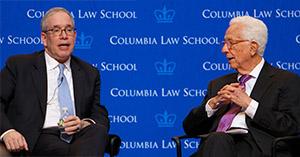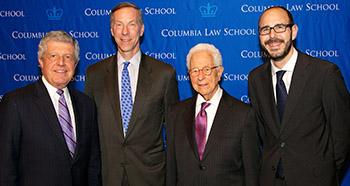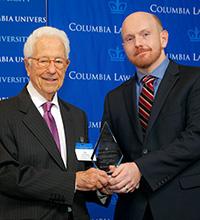Promoting 'Proxy Access'
City Comptroller Scott Stringer, top and left, with Ira Millstein '49 |
| Featured speaker Bill McNabb, second from left, Chairman & CEO of The Vanguard Group, is joined, from left to right, by the Millstein Center's William McCracken, Ira Millstein '49, and center Executive Director Marcel Bucsescu |
| Columbia Law School Professors participating in the Forum include, top row from left to right, Eric L. Talley, Ronald J. Gilson, Robert J. Jackson Jr., Jeffrey N. Gordon and, above at far left, John C. Coffee Jr. |
“Proxy access sets the stage for what we see as the next chapter of corporate governance,” said Stringer, who called for not only more independence but greater diversity among board members. “We need to make sure we have the right directors in the room.” Today’s corporate boards are “still dominated by the few and the privileged,” Stringer said. “It’s the same people, from the same schools, the same country clubs, and, more often than not, they think the same old way. I hate to say it, but most corporate boards in America are pale, male and stale—like me, except they wear better suits.” Fewer than 19 percent of board seats are held by women, only 9 percent are held by African-Americans, and only 5 percent are held by Latinos. “Yet the research on this could not be clearer: Groups that are diverse in background and expertise make better decisions.
| Recipients of the Rising Star of Corporate Governance Awards, recognizing global corporate governance professionals under the age of 40 who are making their mark on the industry, include, clockwise from top left, Nermeen Shehata, Richard Fields (receiving his award from Ira Millstein '49) amd Meryam Omi. |











